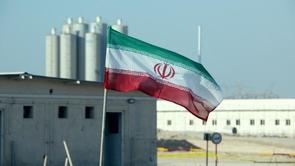 This file photo taken on Nov 10, 2019 shows an Iranian flag in the country's Bushehr nuclear power plant, during an official ceremony to kick-start works on a second reactor at the facility. (PHOTO / AFP)
This file photo taken on Nov 10, 2019 shows an Iranian flag in the country's Bushehr nuclear power plant, during an official ceremony to kick-start works on a second reactor at the facility. (PHOTO / AFP)
TEHRAN - Iran's nuclear chief said the country's yellowcake production capacity has seen a year-on-year rise of 50 percent since the beginning of the current Iranian calendar year, which fell on March 21.
"We have increased yellowcake production capacity by 50 percent compared to last year, and will raise it by another 50 percent by the yearend to double the output compared to two years ago," said President of the Atomic Energy Organization of Iran (AEOI) Mohammad Eslami in an interview with the semi-official Mehr news agency published on Wednesday.
As a type of uranium concentrate powder obtained from leach solutions, yellowcake is an intermediate step in the processing of uranium ores.
"Last year, we had two active (uranium) mines, and currently, the figure has increased to eight," said Eslami.
As a type of uranium concentrate powder obtained from leach solutions, yellowcake is an intermediate step in the processing of uranium ores
Eslami added that five locations have been selected in the provinces of Khuzestan, Bushehr, Hormuzgan, Sistan and Baluchestan and Golestan to construct five new nuclear power plants.
ALSO READ: 'High enriched uranium not produced or accumulated in Iran'
Iran says its nuclear program is completely peaceful, and mainly aimed at generating electricity and producing radiopharmaceuticals.
Faced with international sanctions, the country signed a nuclear deal, formally known as the Joint Comprehensive Plan of Action (JCPOA), with world powers in July 2015, agreeing to put some curbs on its nuclear program in return for the removal of the sanctions on the country.
The United States, however, pulled out of the deal in May 2018 and reimposed its unilateral sanctions on Iran, prompting the latter to drop some of its nuclear commitments according to the law passed by its parliament in December 2020.
The Iranian parliament's law mandated the government to restrict inspections of Iran's nuclear facilities by the International Atomic Energy Agency and accelerate the development of the country's nuclear program beyond the limits set under the JCPOA.
READ MORE: Iran denies enriching uranium above 60%
The talks on the JCPOA's revival began in April 2021 in Vienna. No breakthrough has been achieved after the latest round of talks in August 2022.


